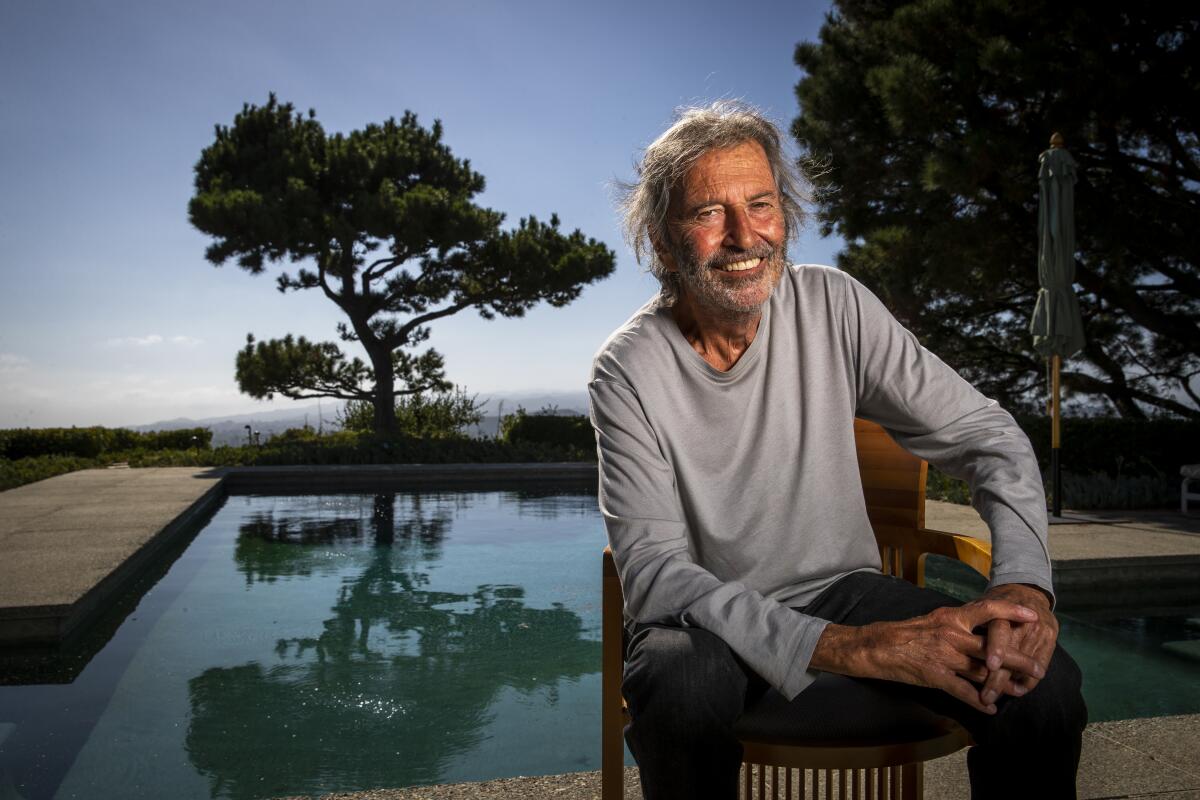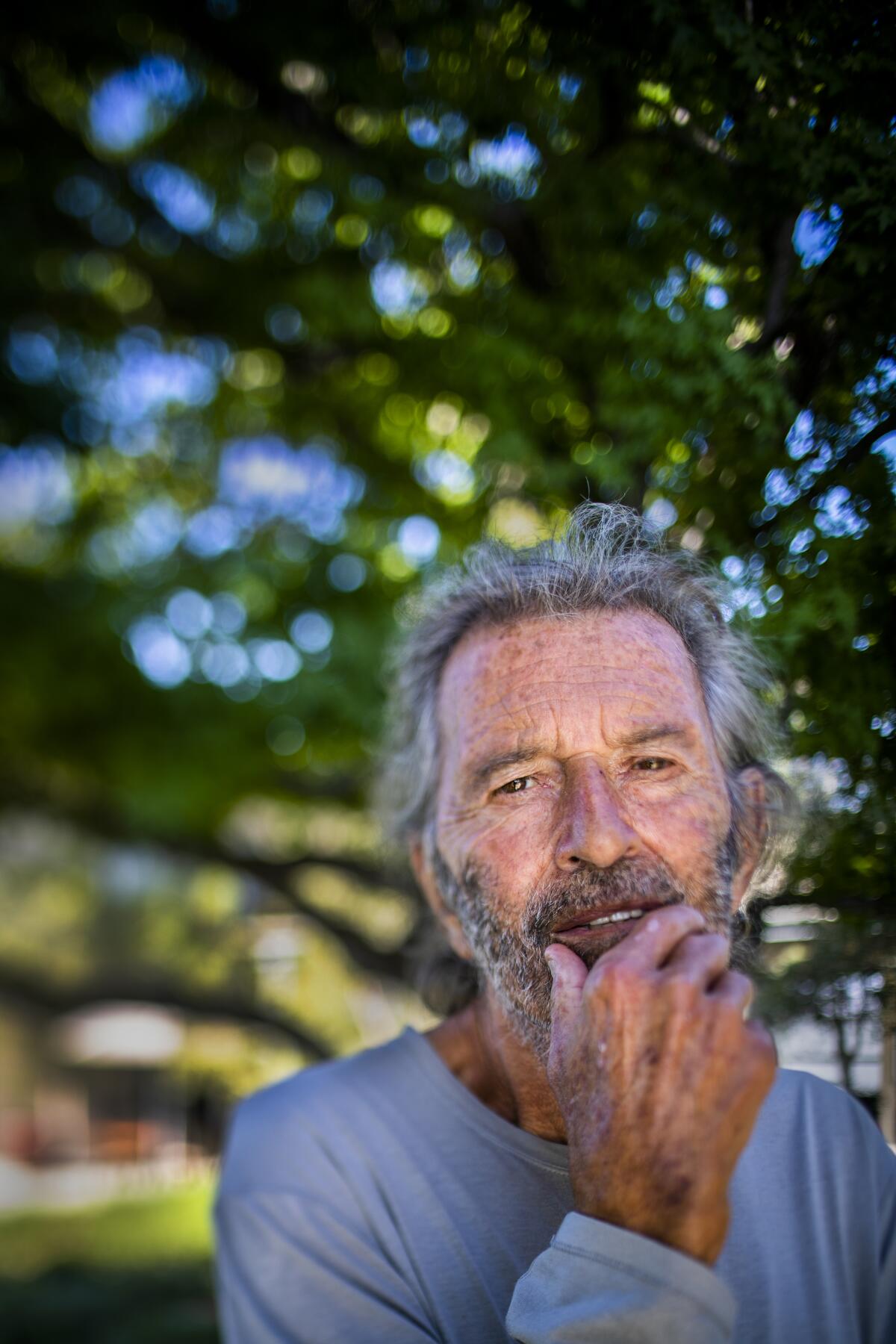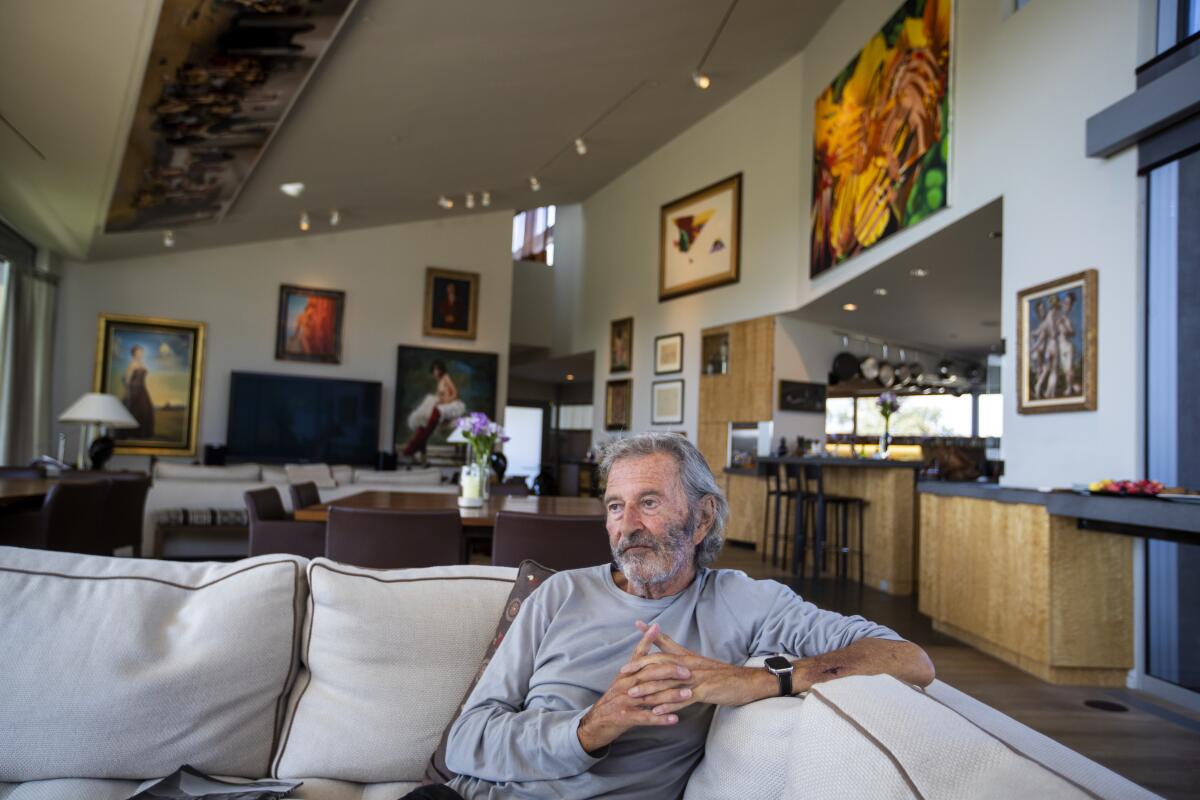He green-lighted ‘Lord of the Rings.’ But what will Bob Shaye’s legacy be?

- Share via
Nude women gaze from various angles in Bob Shaye’s home. Photographed, drawn and painted, they slant from the ceiling, hang on walls. A topless woman sits in red stockings, another snorts diamonds as if cocaine. A Japanese woman takes a lover. A nude statue stands on the lawn. “I like women,” Shaye says. “But not in an abhorrent way.”
In his living room, big windows look over the ocean and make one think of the fine cracks between reality and illusion. Shaye wants to talk about his new film, “Ambition,” which explores the terrifying subconscious and sinister shadows of a deceptive protagonist. It is the story of a millennial violinist, murder, envy and a gathering storm. Rain falls, music turns menacing, bodies pile up. The film has echoes of “A Nightmare on Elm Street,” the franchise Shaye and his studio New Line Cinema produced in 1984, making him a fortune and sending Freddy Krueger‘s razor-sharp fingernails into a string of bloody sequels.
“‘Ambition’ hearkened back to the first, very modest film I made a long time ago called ‘Imagine,’” Shaye says as assistants whisper nearby in the open kitchen. “It dealt with the confusion and uncertainty of what’s real, and ironically that’s come around again with all the fake news stuff. You really don’t know how reliable the narrator is. ... Everything is fuzzy, you don’t know if something is here or there.”
Shaye is 80. His hair is long, his beard graying, his frame, dressed in dark jeans and a pullover shirt, trim. He’s reminiscent of a well-heeled Robinson Crusoe, cast alone by design and circumstance, a man who never quite fit into Hollywood — “I’m not that kind of hustler” — yet made films that helped redefine cinema for the baby boomer generation. These days, he’s reading a Brian Greene book on quantum physics and starting “The Dying Animal,” a Philip Roth novel about a narcissistic professor brought to despair by lust and fear of commitment.
Shaye is nowhere near despair; he’s been married to his wife, Eva, for half a century. Since 1967 he has produced, distributed or directed about 600 films, including taking on one of the biggest risks in Hollywood history when New Line backed the “Lord of the Rings” trilogy, which won 17 Academy Awards and grossed $3 billion at the box office. The gamble after other studios had passed — and the subsequent fights over profit sharing and accounting litigation brought by director Peter Jackson, producer Saul Zaentz and J.R.R. Tolkein’s heirs — was emblematic of Shaye’s contrarian stubbornness.
He has been described through the years as bristly and soulful. A charmer and a scowler with a clever sense of zeitgeist. His career is the diary of a driven man and a film industry that would turn into a landscape of mergers and takeovers. New Line was bought by Ted Turner in 1993 and was later subsumed by Time Warner Inc. A once fiercely independent studio, New Line succumbed to the Hollywood establishment and Shaye lost his job as co-chairman and CEO in 2008. At its height, New Line embodied a heavy-drinking, libertine entertainment industry culture that decades later would collide with the rise of the #MeToo and Time’s Up movements.
“Bob wanted to entertain,” says Sara Risher, who was New Line’s head of production and later founder of ChickFlicks Productions. “He loved movies and frightening people and amazing them. He liked pushing boundaries and taking risks and doing things other people would say no to, like John Waters. My God, nobody wanted Waters’ ‘Pink Flamingos.’ And ‘A Nightmare on Elm Street.’ A lot of people passed on that before we did it. Bob had instincts on what worked.”
Gems in the rocks
The son of a Detroit wholesale grocer, Shaye, a Fulbright scholar with a degree from Columbia Law School, started New Line Cinema with $300 in his New York City apartment. The company was a brash outsider, peddling art films to college campuses, capitalizing on international distribution and the videocassette market, and reimagining the horror genre at a time America was confronting AIDS and Cold War anxieties. Shaye revered the work of Godard and Truffaut as much as he did Wes Craven. He sought niche markets — a grocer finds out what his customers want — and how to squeeze a lot of pennies from them.
“I was picking up rocks and finding little gems,” says Shaye.
“Without Bob I would have never had a career,” says Waters, a cult filmmaker. “He wasn’t an easy man. God knows we had arguments. Bob used to say to me, ‘How do you always get to be friends with the bookkeeper?’ Bob understood that the exploitation film was influencing all the new young directors and that people outside of the intended audience were celebrating them. That is what he figured out really early. He was mixing genres and releasing them to great success.”
The phenomenon of “Nightmare” allowed Shaye and his partner, Michael Lynne, who died in March, to compete with other independent film companies including Bob and Harvey Weinstein’s Miramax. New Line helped make the fortunes of Jim Carrey (“Mask”) and Mike Myers (“Austin Powers”). The company also worked with acclaimed directors David Fincher (“Seven”), David Cronenberg (“A History of Violence”) and Paul Thomas Anderson (“Boogie Nights”).
There were often problems, both comical and maddening, that had to be fixed on the fly, as when Jack Palance had second thoughts about his role in a 1982 slasher film.
“Jack has a night [shoot] and he comes out of his trailer and says, ‘I don’t know what I’m doing here. I don’t like to work at night,’” says Shaye. “I said, ‘Geez, Jack, the name of the film is ‘Alone in the Dark’ and it’s about maniacs who escape from an insane asylum and terrorize a family.’ He said, ‘And another thing, I don’t want to kill anybody.’ I said, ‘Jack you’re the key guy of the three maniacs.’ He wouldn’t come out of the trailer until the executive producer went in and said, ‘Jack, you gotta help us out here.’”
Shaye did not embrace Hollywood but he influenced it. Young executives who worked for him ended up in top industry jobs, including Toby Emmerich, chairman of the Warner Bros. Picture Group, and Michael De Luca, who went on to DreamWorks and Sony Pictures. De Luca joined New Line as an intern. He became a protégé of Shaye’s and was behind a burst of commercial hits and critically acclaimed films (“Dumb and Dumber” and “American History X”) and a series of flops (“Last Man Standing” and “Little Nicky”).
The moral horizon
New Line became known not only for its movies but for its loose atmosphere and drunken soirees, including a tabloid sensation when De Luca had oral sex with a woman at a 1998 William Morris Agency Oscar party. De Luca kept his job after the incident, getting away with “a stern reprimand,” as this paper reported at the time. But in 2001 Shaye fired De Luca after growing box office disappointments.
New Line also worked with director Brett Ratner (“Rush Hour”), who a 2017 Times investigation found was accused by six women of sexual misconduct dating back to the early 1990s. Ratner has denied wrongdoing. Talk show host Charlie Rose, fired by CBS in 2017 over sexual harassment allegations, narrated a documentary celebrating New Line’s 40th anniversary.
In 1998, two decades before the #MeToo movement, Premiere magazine published a story relying largely on anonymous sources that alleged Lynne and Shaye created a culture of sexual harassment and unwanted advances. The article sent a shudder through Hollywood. But the tempest faded, notably after other entertainment reporters discredited it as punitive and a “hatchet job.”
Two years ago, as Harvey Weinstein faced rape allegations and other men across the entertainment world were accused of sexual misconduct, Liz Manne, a former executive vice president at New Line, disclosed in a column for IndieWire that she was one of Premiere’s sources. Manne wrote that she was sexually assaulted by a senior company executive (not Shaye), and that such behavior was endemic at New Line in an era when powerful male executives preyed on women in the TV, film and art industries.
In an email to the Times last month, Manne, a management and marketing consultant, described New Line as a “painful, harmful working environment.” She said: “I don’t know why it’s always the women’s and survivors’ responsibility to pull their guts out to help these stories get told. Our lives — not to mention our careers and incomes — have already been shredded by being at the wrong company at the wrong time, unlike the ‘good guys’ of New Line whose professional lives remain unscathed.”

Shaye denies the allegations, adding: “There certainly wasn’t any pay-to-play stuff going on at New Line as far as I was concerned. Nobody ever said you get a part in a movie if you sleep with me.
“There’s interaction [at work] between men and men, women and women, and men and women,” he says. “You spend eight to 10 hours of your day [there]. Look at doctors and nurses, you know, it’s not just in the operating room. There’s things that go on, believe me, in a lot of the empty examination rooms. I worked in a hospital for a while. It’s kind of human nature, but there has to be a moral horizon that you just don’t cross. Sometimes you don’t really know if you’ve crossed it or not. ... I can only speak for myself and the answer is no.”
Shaye has been credited with advancing the careers of women, including Risher, who says she experienced no sexual harassment at New Line, and Donna Langley, a former New Line production executive and now chairman of the Universal Filmed Entertainment Group. Rachel Talalay started as an accountant with Shaye and went on to produce and direct films, including “Freddy’s Dead: The Final Nightmare.”
“For Bob to let a woman do as much as he let me do and to promote and support a woman in the way that he did for me is quite remarkable,” says Talalay. “But sometimes you had to suffer his stresses. He could be quite brutal.”
Shaye and Lynne founded Unique Features after they were forced out of Time Warner in 2008. The independent company works with filmmakers who Shaye says can speak on everything from global warming to streaming platforms. Technology is outpacing imagination, adds Shaye, who notes it’s a fascinating time, sorting through endless torrents of films and TV shows. “The big question is: Is there too much?”
“Ambition,” which he says is “certainly not fancy — it’s meant to be entertaining,” opens Friday. He is modest when talking about his work, as if his talent, especially when it comes to directing, could never match his passion. He’s traveling soon to United Arab Emirates to talk to young directors. And he recently sold to Netflix “The Liberator,” a World War II-set four-part series that has the computer-driven animation visuals of a graphic novel.
“I’m having a personal renaissance,” he says. “I’ve always liked turning people on. Even in grade school. I did the ‘War of the Worlds’ radio show in the auditorium. I feel a moral obligation. You’re asking people to give you two hours of their time. That’s the most valuable thing you can take.”

Late morning light fills the house. The nudes — works by Utamaro, David LaChapelle, Francis Bacon and others — glimmer. The view stretches across the hills to the ocean. Like an eerie, uninvited spirit, Shaye’s Apple watch starts talking to him. He laughs and shuts it off. He speaks of things that still bother him — the legal dispute with Jackson, which Shaye blames on accounting issues — and that fortuitous night he met Ian McKellen in a London restaurant. McKellen’s agent had informed Shaye that the actor had a scheduling conflict and would not be a wizard in “The Lord of the Rings.”
Shaye went over to McKellen. He told him that he admired his work and was disappointed he couldn’t play Gandalf. The actor smiled politely. Shaye walked back to his table but, before he sat down, he returned to McKellen. He asked what the timing conflict was. McKellen said he had three more days of shooting on an “X-Men” film. Shaye laughed. As a grocer’s son, he had certainly encountered more exasperating logistics. He told McKellen it wasn’t a problem; he would push back the “Rings” schedule.
It was a lesson Shaye had learned many times. People in the movie business say no all the time. But things change. Conditions shift. But you keep asking, until one day, instead of an impossibility, a contract is signed and the crack narrows between reality and illusion.
More to Read
Only good movies
Get the Indie Focus newsletter, Mark Olsen's weekly guide to the world of cinema.
You may occasionally receive promotional content from the Los Angeles Times.








